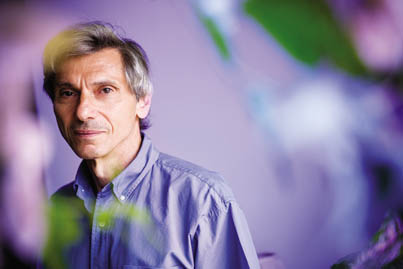Satanic Purse: Book explodes myths of terrorist funding
Satanic Purse: Book explodes myths of terrorist funding McGill University
User Tools (skip):

R.T. Naylor researches international black markets, smuggling, money laundering, environmental crime and terrorist financing.
Claudio Calligaris
Satanic Purses
Book explodes myths of terrorist funding
Is Osama bin Laden the world's most dangerous man or is he a comic book villain whose evil genius has been exaggerated out of proportion? Ask economics professor R.T. Naylor and he'll tell you that our perceptions about the supposed mastermind of global terror are based more on spin-doctoring than fact. In his latest book Satanic Purses: Money, Myth and Misinformation in the War on Terror he asserts that Western perceptions of the al-Qaeda leader: emerging in Afghanistan with a copy of the Qur'an in one fist and a Kalashnikov in the other, conjuring the dark forces of worldwide jihad, are grossly exaggerated.
Naylor argues that like the myths about bin Laden, the existence of billions of Islamic terrorist dollars are fabrications of the U.S. Government whose misguided agenda is to perpetuate an illusionary war against terror, in order to inflict death and chaos in places like Iraq while simultaneously advancing a political agenda that undermines individual rights to privacy and due process at home.
A culmination of thirty years' work as a historian, criminologist and expert in international political economy, Naylor described Satanic Purses as counterpoint to post 9/11 propaganda. "It brings together my expertise in finance, politics and both Middle Eastern and North American history as it relates to the deeply embedded prejudices against Muslims and Arabs that have existed in the West since the time of the crusades."
Insisting that the costs of the war on terror are enormous, in Satanic Purses, Naylor attacks Western saber rattling as a perpetuation of lies. "Apart from sending the military to eviscerate wedding parties in Afghanistan and to turn Fallujah, Iraq's sparkling city of mosques, into another Mesopotamian archaeological site, the Terror War has converted the world's banking infrastructure into a global espionage apparatus. It has led to a set of of legal atrocities in which the main evidence against the accused consists of media gossip, claims by 'national security experts' with ethnopolitical axes to grind, and fables spun by informants bribed or coerced in testifying."
Naylor, who 15 years ago was the Canadian director of the American Arab Anti-discrimination Committee, dismisses the U.S. Government's rhetoric about the scope of al-Qaeda's financial and organization power and attests that the fuel that really drives terrorism is poverty. "There are lots of people in the world willing to do awful things but there's no financial connection that links extremists together — the only thing that binds them is a sense of injustice and commitment. From time to time people may provide assistance to one another, but the sad truth about terrorism is that it's totally ad hoc. But it's not nearly as handy, politically, to admit to that when creating a grand satanic conspiracy better motivates public opinion."
With family roots in Lebanon, Naylor is deeply disturbed by the violence that has recently plagued the country where his grandfather once lived. "The current crisis is born out the United States decision to attempt to transform public opinion against Hamas and Hezbollah and turn them into subsidiaries of al-Qaeda." He described both groups as having important social and humanitarian mandates and believes that both organizations have been forced to flex their military arms in reaction to Israeli atrocities.
Pointing blame at the American industrial military complex and powerful lobby groups, Naylor insists that the United States lacks a long-term vision with regards to foreign policy. The author of many books, including Hot Money and the Politics of Debt and Bankers, and Bagmen and Bandits, dismisses the claim that the United States' goal is to bring democracy to the Middle East and argues that if the aim is liberation, the American government should drop the rhetoric about Hamas being a terrorist organization and begin, instead, to address the Palestinian problem and the oppressive circumstances faced by the residents of the occupied territories.
Search
Search (skip):
"There are lots of people in the world willing to do awful things but there's no financial connection that links extremists together — the only thing that binds them is a sense of injustice and commitment. From time to time people may provide assistance to one another, but the sad truth about terrorism is that it's totally ad hoc."Economics professor R.T. Naylor

